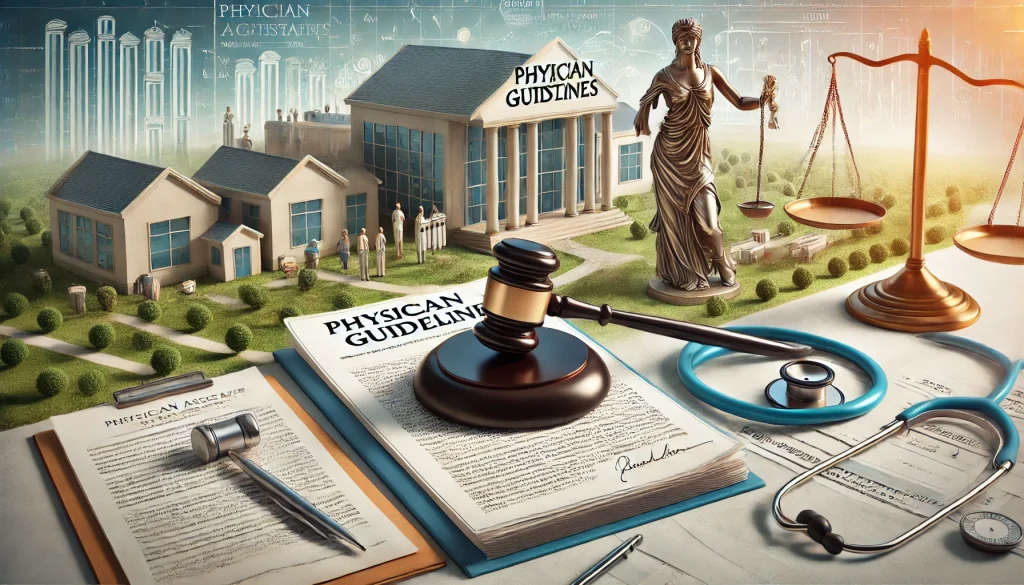The Matthew Eisert physician assistant lawsuit has drawn attention to important legal and ethical issues surrounding the responsibilities and accountability of physician assistants in the healthcare industry. This case highlights how healthcare professionals must navigate both medical practice and legal obligations.
In the lawsuit, specific allegations have been made against Matthew Eisert, which are being closely scrutinized. These claims may have serious implications for both his career and the broader healthcare community.
The Matthew Eisert physician assistant lawsuit also underscores the critical role of regulatory bodies and legal frameworks in maintaining the quality of care provided by physician assistants. This case will likely influence future discussions on healthcare liability and patient safety.
Background and Overview of Matthew Eisert’s Medical Practice
Matthew Eisert, a licensed physician assistant, has had a long career in healthcare, working closely with physicians and providing direct patient care. His work mainly involved diagnosing illnesses, prescribing medications, and managing treatment plans under the supervision of a licensed doctor. This allowed him to function similarly to a general practitioner in many settings.
As a physician assistant, Eisert likely specialized in specific areas of medicine depending on his professional focus and the needs of his supervising physicians. His role was to bridge the gap between patients and doctors, ensuring that medical services were delivered efficiently.
Physician assistants like Matthew Eisert often work in both private practices and larger healthcare organizations. His reputation in the healthcare community would have depended heavily on his ability to manage patients effectively, communicate with other healthcare professionals, and follow medical regulations.
Before the lawsuit, Eisert was likely considered a trusted figure in his field, managing routine tasks as well as more complex cases. His practice would have followed strict healthcare guidelines, making the allegations brought against him a notable deviation from expected standards.
Testimonies and Reflections from the Matthew Eisert Physician Assistant Lawsuit: Perspectives from Patients, Legal Teams, and Experts
The Matthew Eisert physician assistant lawsuit has brought to light personal experiences and professional reflections from various individuals involved in the case. Patients, in particular, have shared the emotional toll the case has taken on them. One patient commented,
“I felt neglected after my treatment. It’s hard to reconcile the trust I placed in the medical team with the outcome I experienced.”
This quote emphasizes the emotional impact that patients often endure when medical care does not meet their expectations.
Matthew Eisert, defending his actions, has maintained his commitment to his patients, stating,
“I have always strived to follow medical guidelines and acted in the best interest of those under my care, ensuring that all steps were taken with professional integrity.”
His words reflect the challenges healthcare professionals face when their decisions are questioned, particularly in a high-stakes environment like a lawsuit.
The plaintiff’s legal team has focused on the responsibility that healthcare providers have to their patients, arguing,
“Patients deserve competent care. When that care falls short, the system must hold medical professionals accountable to ensure no one else is harmed.”
This argument reflects the growing demand for accountability within the healthcare system and the role that lawsuits play in enforcing those standards.
Experts in the medical field provided further insight into the case, with one expert remarking,
“Cases like this highlight the need for stronger communication and clearer protocols between healthcare teams to prevent errors and protect patient safety.”
These expert reflections shed light on the broader implications of the lawsuit, pointing to the importance of collaboration and communication in medical practice.
The Matthew Eisert physician assistant lawsuit offers a compelling example of the legal and ethical challenges faced by healthcare providers, illustrating the vital importance of trust, clear communication, and adherence to medical standards in ensuring patient safety and professional accountability.
Allegations in the Matthew Eisert Physician Assistant Lawsuit
The Matthew Eisert physician assistant lawsuit revolves around specific claims of malpractice or professional misconduct. These allegations might include misdiagnosis, incorrect treatment plans, or a failure to provide adequate patient care. The exact nature of the charges is critical to understanding the depth of this case.
The lawsuit may allege that Eisert overstepped his legal responsibilities or failed to properly communicate with his supervising physician, leading to harm or injury to a patient. Such allegations could also involve prescribing medication without the proper authority or ignoring critical symptoms.
Common Allegations in Physician Assistant Lawsuits:
- Failure to diagnose or misdiagnosis
- Improper prescribing of medication
- Lack of informed consent from patients
- Inadequate supervision by the attending physician
In the case of Matthew Eisert, the outcome will hinge on proving whether he followed the established protocols for physician assistants. A table outlining possible consequences of malpractice cases might be useful here:
| Allegation | Possible Consequence |
| Misdiagnosis | License suspension |
| Prescribing without authority | Legal penalties |
| Failure to supervise | Medical license revocation |
The impact of these allegations, if proven, can range from professional disciplinary actions to civil or criminal liability, depending on the severity of the misconduct.
Legal Framework Governing Physician Assistants
Physician assistants (PAs) like Matthew Eisert operate under a clearly defined legal framework that outlines their scope of practice. These regulations vary by state but generally require PAs to work under the supervision of a licensed physician. The physician remains legally responsible for the PA’s actions, making the collaborative nature of this relationship essential for patient safety.

The legal framework also defines the range of duties PAs can perform, such as conducting physical exams, diagnosing illnesses, and prescribing medications. However, these tasks must adhere to the medical guidelines set forth by the state board of medicine.
Key Components of PA Legal Framework:
- Supervision requirements: Physicians must oversee PAs and review their work.
- Scope of practice: Defines what tasks a PA is allowed to perform.
- Prescribing authority: Often limited and requires additional certification.
- Liability: Both the PA and supervising physician can be held responsible for negligence.
Matthew Eisert’s lawsuit could focus on whether he violated these legal boundaries. For example, if it’s proven that he acted outside his authorized scope or failed to meet the supervision requirements, his actions may be deemed unlawful.
Key Players in the Matthew Eisert Physician Assistant Lawsuit
Several key players are involved in the Matthew Eisert physician assistant lawsuit, each playing a crucial role in the outcome of the case. First and foremost is Matthew Eisert himself, the central figure accused of professional misconduct. His defense team will likely argue that he adhered to the standards of care expected of a physician assistant.
The supervising physician, whose role is to oversee Eisert’s work, will also be a key figure in the lawsuit. Their level of involvement and responsibility will be scrutinized to determine whether they properly supervised Eisert or if they too share some liability.
Additionally, the healthcare facility where Eisert worked may be implicated in the case. If the lawsuit claims systemic issues such as understaffing or improper training, the organization itself could face legal consequences.
Key Players in the Case:
- Matthew Eisert: The physician assistant at the center of the lawsuit.
- Supervising Physician: Responsible for overseeing Eisert’s medical practice.
- Healthcare Facility: Could be held liable for systemic issues contributing to malpractice.
- Plaintiff (Patient): The person bringing the allegations, claiming harm due to Eisert’s care.
The attorneys representing both sides will also play pivotal roles in shaping the arguments and evidence presented during the trial. The legal teams’ strategies, including any settlement negotiations, will significantly affect the direction of the case.
Potential Consequences for Matthew Eisert and His Career
The Matthew Eisert physician assistant lawsuit could have significant ramifications for his career, depending on the severity of the allegations and the court’s decision. The most immediate consequence could be disciplinary actions by the medical board, including suspension or revocation of his license to practice as a physician assistant.
Another potential consequence is reputational damage. Regardless of the outcome of the lawsuit, the mere association with legal action can tarnish a healthcare professional’s standing within the medical community. This could make it difficult for Eisert to find employment in the future, even if he is cleared of all charges.
Financial consequences are also a possibility. In malpractice lawsuits, defendants may be required to pay large sums in damages if the court rules in favor of the plaintiff. This can result in significant personal and professional financial strain, potentially impacting Eisert’s ability to continue practicing in his field.
The lawsuit could also lead to long-term regulatory monitoring. If found guilty, Eisert might face more stringent oversight in his future practice, limiting his autonomy and ability to perform certain tasks. This would alter the scope of his work and create additional hurdles in his career.
How Physician Assistant Lawsuits Impact Healthcare Practices
Lawsuits involving physician assistants, such as the Matthew Eisert physician assistant lawsuit, can have broader implications for healthcare practices. Healthcare facilities may tighten regulations and policies around the supervision of physician assistants to mitigate the risk of future lawsuits. This might involve increased oversight or additional training requirements for both PAs and supervising physicians.
Such lawsuits can also lead to changes in patient care protocols. Healthcare institutions might impose stricter guidelines on how PAs interact with patients, including requiring more documentation and follow-up to ensure compliance with standards of care.
Lawsuits can create a culture of fear among healthcare providers, potentially making them more cautious in their clinical decision-making. This could lead to defensive medicine, where physicians and PAs order more tests and procedures than necessary to avoid liability, which in turn increases healthcare costs.
Impacts on Healthcare Practices:
- Increased supervision and regulation of PAs
- Changes to patient care protocols
- Rise in defensive medicine and healthcare costs
- The strain on the healthcare workforce due to heightened legal risks
Defense Strategies in the Matthew Eisert Physician Assistant Lawsuit
The defense team in the Matthew Eisert physician assistant lawsuit will likely employ several strategies to mitigate the charges against him. One common approach is to challenge the credibility of the evidence presented by the plaintiff. This could involve scrutinizing medical records, witness testimony, and expert opinions to highlight inconsistencies or exaggerations in the claims made.
Another key strategy may involve emphasizing that Eisert followed standard medical practices and protocols throughout his treatment of the patient. By demonstrating that he acted within the scope of his professional responsibilities and followed the guidance of his supervising physician, Eisert’s defense can argue that he should not be held liable for any alleged wrongdoing.
In some cases, the defense might seek to settle the case outside of court to avoid lengthy legal battles. Settlements allow both parties to agree on compensation without the uncertainty of a trial outcome, but they still carry reputational risks for Eisert.
If the supervising physician’s role comes into question, the defense might also argue that any fault lies with the physician’s oversight rather than Eisert’s actions, shifting some liability away from Eisert. However, this strategy could complicate professional relationships and cause further tensions.
Ethical Considerations in Medical Lawsuits Involving Physician Assistants
Ethical considerations play a vital role in medical lawsuits involving physician assistants, such as the Matthew Eisert physician assistant lawsuit. One of the key ethical dilemmas is balancing patient safety with the professional autonomy of healthcare providers. Physician assistants are expected to make critical decisions in patient care while adhering to ethical standards, but lawsuits often question whether those decisions were made with patient well-being in mind.

Another ethical issue is the relationship between the physician assistant and the supervising physician. Ethical questions arise regarding whether the physician provided adequate supervision or if the PA acted independently beyond their ethical boundaries. This relationship is crucial for ensuring that patients receive safe and competent care, and legal cases often explore these dynamics.
Informed consent is another ethical consideration. PAs must ensure that patients fully understand the risks and benefits of any proposed treatments. Allegations in lawsuits often focus on whether the patient’s consent was obtained ethically and whether they were given adequate information about the risks.
Ethical Issues in Medical Lawsuits:
- Autonomy vs. patient safety
- Adequate supervision by physicians
- Informed consent
- Professional responsibility in malpractice cases
These ethical challenges must be navigated carefully, as they not only affect the legal outcome but also the reputation and trust patients place in the healthcare system.
The Role of Licensing Boards in Physician Assistant Disciplinary Actions
Licensing boards play a critical role in overseeing physician assistants and ensuring they meet professional standards. In cases like the Matthew Eisert physician assistant lawsuit, the licensing board will be responsible for determining whether Eisert violated any professional regulations. These boards are tasked with protecting public health and ensuring that healthcare professionals maintain competence and adhere to ethical guidelines.
When a complaint is filed against a physician assistant, the licensing board typically conducts an investigation to assess the validity of the claims. This process often involves reviewing medical records, interviewing witnesses, and assessing whether the PA acted within their scope of practice.
If the board finds evidence of misconduct, several disciplinary actions may be imposed. These can range from issuing a formal reprimand to suspending or permanently revoking the PA’s license. In the case of Matthew Eisert, if the board concludes that he violated the law or ethical codes, they could restrict his ability to practice medicine.
Licensing boards also have the authority to require further education or training for the PA as a condition for retaining their license. This ensures that the PA is kept up to date on the latest medical guidelines and standards.
The Legal Proceedings in the Matthew Eisert Physician Assistant Lawsuit
The Matthew Eisert physician assistant lawsuit will follow the typical stages of a civil medical malpractice case. The legal proceedings begin with the filing of the complaint by the plaintiff, which outlines the specific allegations against Eisert. The lawsuit then enters the discovery phase, where both sides exchange evidence, such as medical records and witness testimonies.
During discovery, expert witnesses are often called to provide their opinion on whether Eisert’s actions met the accepted standards of care for a physician assistant. This is a critical part of the lawsuit, as expert opinions can significantly influence the court’s decision.
Following discovery, the lawsuit may proceed to trial if both parties do not reach a settlement. At trial, the plaintiff’s attorneys will present their case, attempting to prove that Eisert’s negligence caused harm to the patient. The defense will counter by arguing that Eisert acted within his professional boundaries and followed medical protocols.
Depending on the outcome, the court may rule in favor of the plaintiff or dismiss the case. In some instances, the lawsuit may also end in a settlement agreement, where Eisert or his insurance provider agrees to compensate the plaintiff without admitting fault.
Precedents Set by Other Physician Assistant Lawsuits
Other physician assistant lawsuits provide important precedents that could influence the outcome of the Matthew Eisert physician assistant lawsuit. These cases help establish legal benchmarks regarding the scope of a physician assistant’s duties and responsibilities, as well as the level of supervision required by the overseeing physician.

For example, in past cases, courts have determined that physician assistants are held to the same standard of care as physicians when performing certain medical tasks. This means that PAs can be liable for negligence if they fail to provide appropriate care, even under physician supervision.
Another precedent set by previous lawsuits involves the question of informed consent. Courts have ruled that physician assistants must ensure that patients are fully informed about their treatment options and risks. Failure to obtain proper consent can result in liability, as seen in several cases involving patient harm due to miscommunication.
| Precedents Set by Other PA Lawsuits | Legal Outcome |
| PA held to physician standards | Liability for negligence |
| Failure to obtain informed consent | PA found liable for patient harm |
| Inadequate supervision by a physician | Shared liability with supervising doctor |
By looking at these precedents, attorneys in the Matthew Eisert case can build stronger arguments and anticipate how the court may interpret similar issues.
What Can Be Learned from the Matthew Eisert Physician Assistant Lawsuit?
The Matthew Eisert physician assistant lawsuit offers important lessons for both healthcare professionals and institutions. One key takeaway is the importance of clearly defining the scope of practice for physician assistants. Ensuring that PAs understand their responsibilities and limitations can help prevent future legal issues and improve patient safety.
Another lesson from this case is the value of thorough documentation and communication in medical practice. PAs must maintain detailed records of patient interactions, diagnoses, and treatment plans to demonstrate that they acted within legal and professional guidelines. Clear communication with supervising physicians is also crucial in ensuring that care is delivered safely.
Healthcare institutions can also learn from this lawsuit by reviewing their policies regarding the supervision of physician assistants. Implementing stronger oversight and ensuring that PAs have adequate support may reduce the risk of malpractice claims.
Finally, this case underscores the importance of ethical decision-making in medical practice. Physician assistants must always prioritize patient well-being and avoid taking actions that could be perceived as negligent or harmful. The outcome of the Matthew Eisert physician assistant lawsuit will likely highlight the ethical responsibilities of PAs and serve as a reminder to all healthcare providers to adhere to the highest standards of care.
The Last Word on Matthew Eisert Physician Assistant Lawsuit
The Matthew Eisert physician assistant lawsuit highlights several important aspects of medical practice, particularly the roles and responsibilities of physician assistants. This case serves as a reminder that healthcare professionals must operate within the legal and ethical boundaries established by their profession. Physician assistants, like Eisert, are expected to provide high-quality care under the supervision of licensed physicians, but even minor deviations from standards can lead to serious legal consequences.
One key takeaway from this lawsuit is the importance of proper supervision and communication between physician assistants and their supervising doctors. Without clear guidelines and oversight, the risk of malpractice increases, putting both patient safety and the careers of healthcare professionals in jeopardy.
Additionally, the lawsuit underscores the need for physician assistants to remain vigilant in maintaining detailed records and documentation. In the event of legal action, accurate and thorough medical records can provide critical evidence of whether the standard of care was followed.

